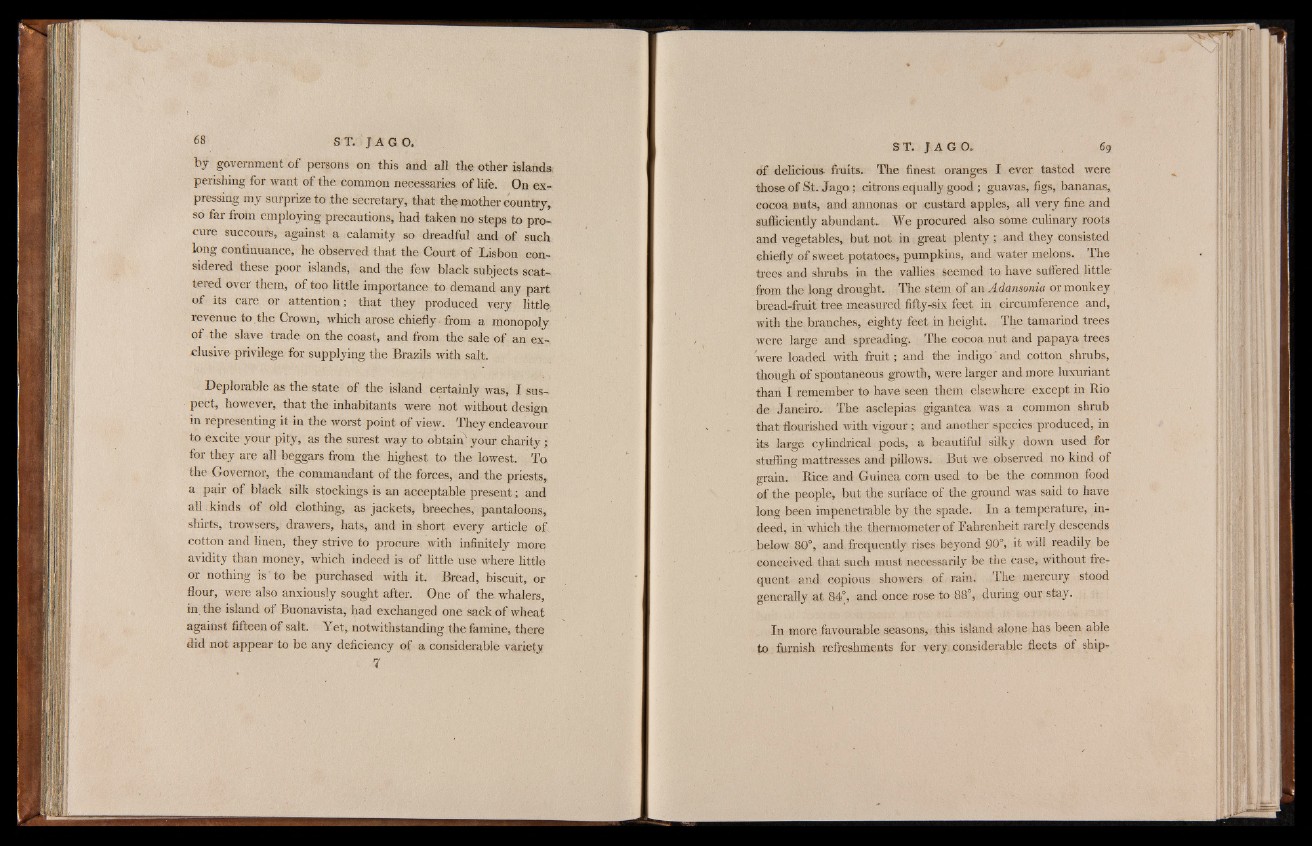
68 S T. J A G O.
by government of persons on this and all the other islands
perishing for want of the common necessaries of life. On expressing
my surprize to the secretary, that the mother country,
so far from employing precautions, had taken no steps to procure
succours, against a calamity so dreadful and of such
long continuance, he observed that the Court of Lisbon considered
these poor islands, and the few black subjects scattered
over them, of too little importance to demand any part
of its care or attention; that they produced very little
revenue to the Crown, which arose chiefly from a monopoly
of the slave trade on the coast, and from the sale of an exclusive
privilege for supplying the Brazils with salt.
Deplorable as the state of the island certainly was, I suspect,
however, that the inhabitants were not without design
in representing it in the worst point of view. They endeavour
to excite your pity, as the surest way to obtain^ your charity;
for they are all beggars from the highest to the lowest. To
the Governor, the commandant of the forces, and the priests,
a pair of black silk stockings is an acceptable present; and
all kinds of old clothing, as jackets, breeches, pantaloons,
shirts, trowsers, drawers, hats, and in short every article of
cotton and linen, they strive to procure with infinitely more
avidity than money, which indeed is of little use where little
or nothing is to be purchased with it. Bread, biscuit, or
flour, were also anxiously sought after. One of the whalers,
in the island of Buonavista, had exchanged one sack of wheat
against fifteen of salt. Yet, notwithstanding the famine, there
did not appear to be any deficiency of a considerable variety
7
ST. J A G O . , 69
of delicious fruits. The finest oranges I ever tasted were
those of St. Jag o ; citrons equally good; guavas, figs, bananas,
cocoa nuts, and annonas or custard apples, all very fine and
sufficiently abundant.. We procured also some culinary roots
and vegetables, but not in great plenty ; and they Consisted
chiefly of sweet potatoes, pumpkins, and water melons. The
trees and shrubs in the vallies seemed to have suffered little-
from the long drought. The stem of an Adansonia or monkey
bread-fruit tree measured fifty-six feet in circumference and,
with the branches, eighty feet in height. The tamarind trees
were large and spreading. The cocoa nut and papaya trees
were loaded with fruit; and the indigo'and cotton shrubs,
though of spontaneous growth, were larger and more luxuriant
than I remember to have seen them elsewhere except in Rio
de Janeiro. The asclepias gigantea was a common shrub
that flourished with vigour; and another species produced, in
its large cylindrical pods, a beautiful silky down used for
stuffing mattresses and pillows. But we observed no kind of
grain. Rice and Guinea corn used to be the common food
of the people, but the surface of the ground was said to have
long been impenetrable by the spade. In a temperature, indeed,
in which the thermometer of Fahrenheit rarely descends
below 80°, and frequently rises beyond 90°, it will readily be
conceived that such must necessarily be the case, without frequent
and copious showers of rain. The mercury stood
generally at 84°, and once rose to 88°, during our stay.
In more favourable seasons, this island alone has been able
to furnish refreshments for very considerable fleets of ship